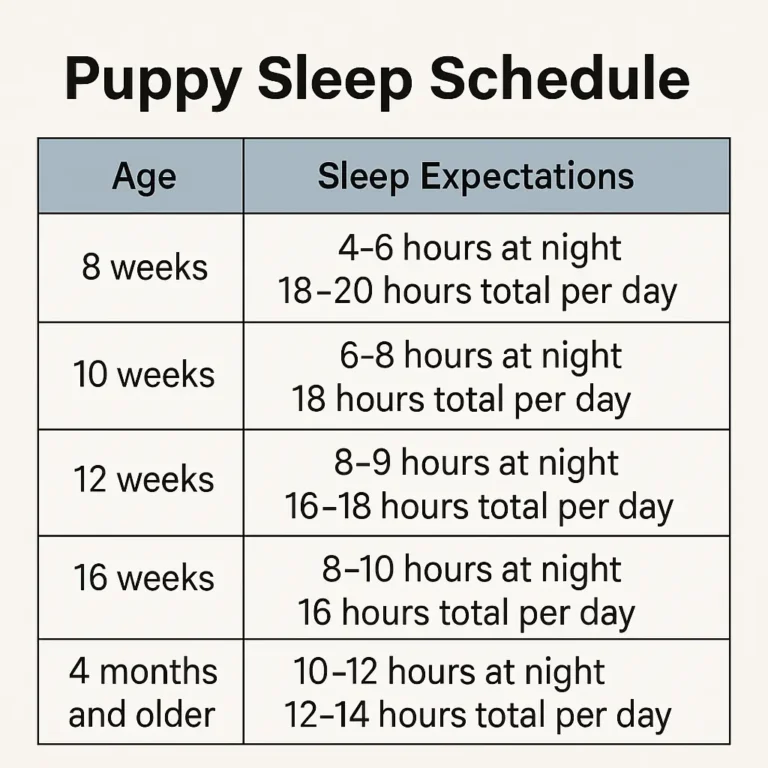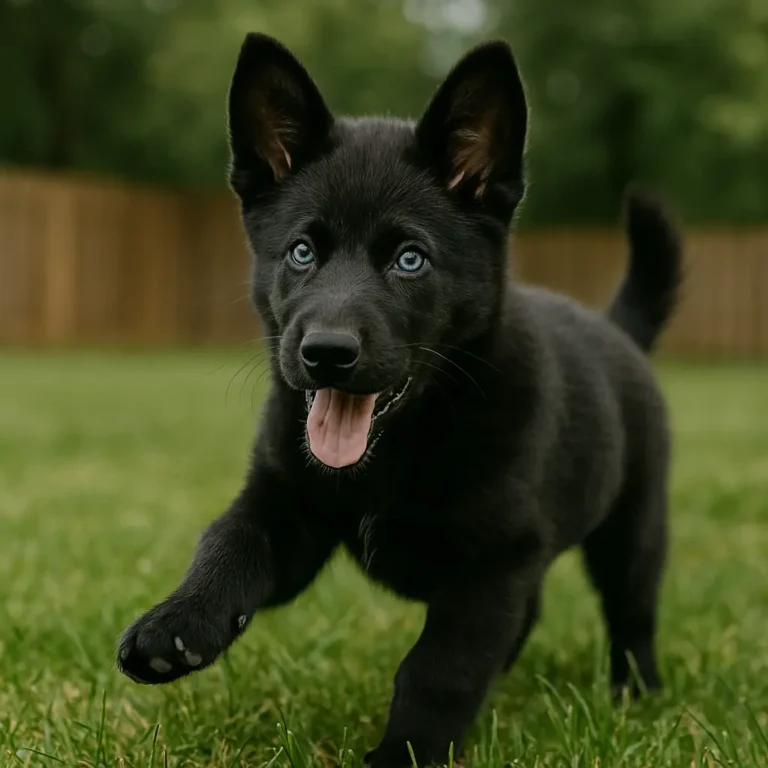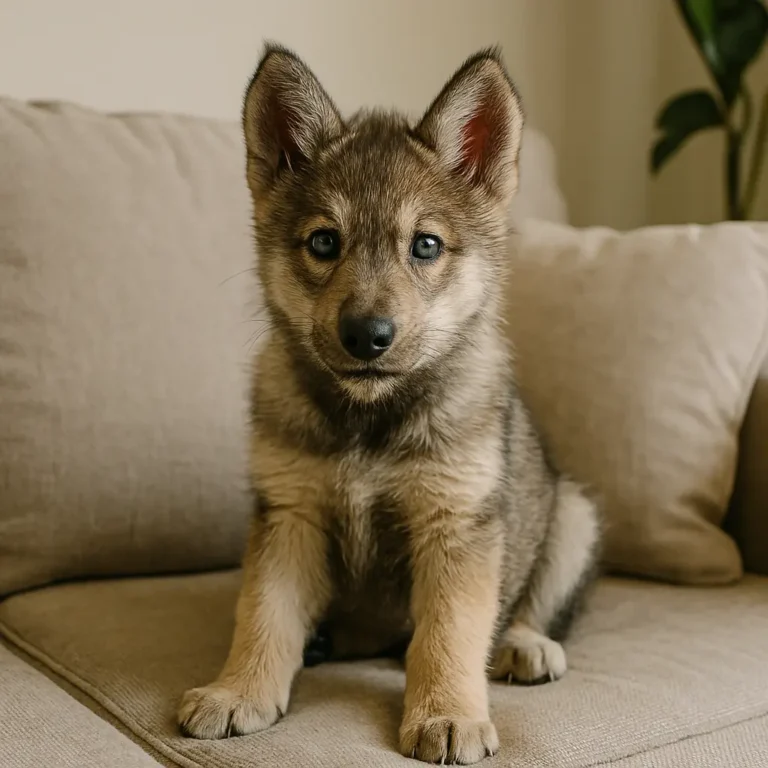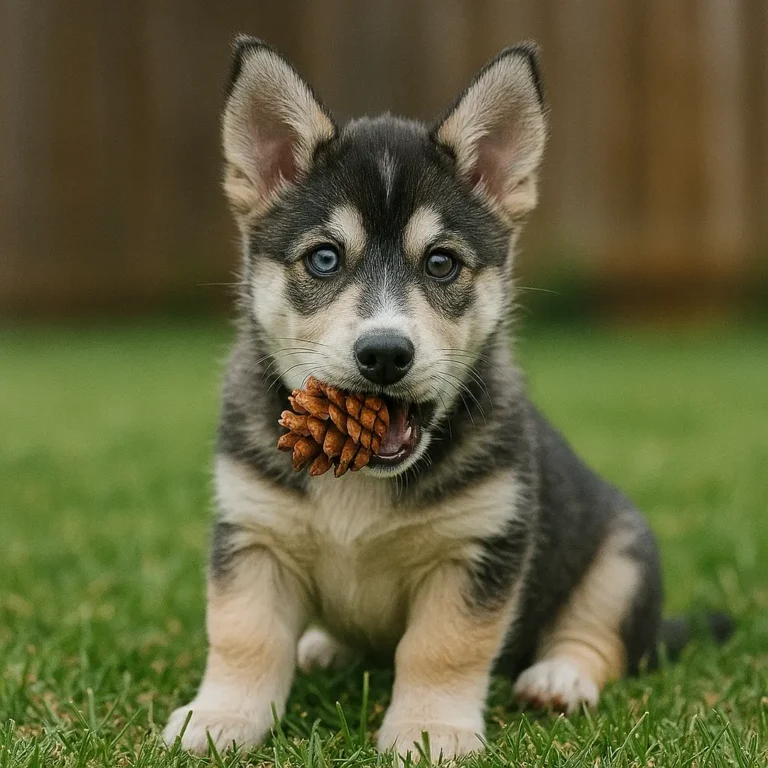If you lead an active lifestyle and are ready to invest in training and care, the White Husky can make an excellent companion. Their stunning appearance, friendly nature, and energetic personality make them a joy to have as part of the family. Just be prepared for their grooming needs, independent nature, and exercise requirements. With the right environment, the White Husky will thrive and become a loyal, loving part of your life.
White Husky
All You Need to Know About the White Husky
The White Husky is an incredibly stunning breed, known for its striking all-white coat and captivating blue or multicolored eyes. As a mix of the Siberian Husky, this breed carries the same energy, intelligence, and loyalty but with a more striking appearance. Their snow-white fur makes them highly recognizable and cherished among dog lovers. Though their look is particularly striking, White Huskies come with unique care requirements and distinct personality traits. This breed is ideal for active owners who can provide plenty of exercise and mental stimulation. Despite being independent, White Huskies bond closely with their families and are excellent companions for those ready for the commitment. If you’re considering adopting a Husky, read on to discover all you need to know about their traits, training, and the best environment for them.
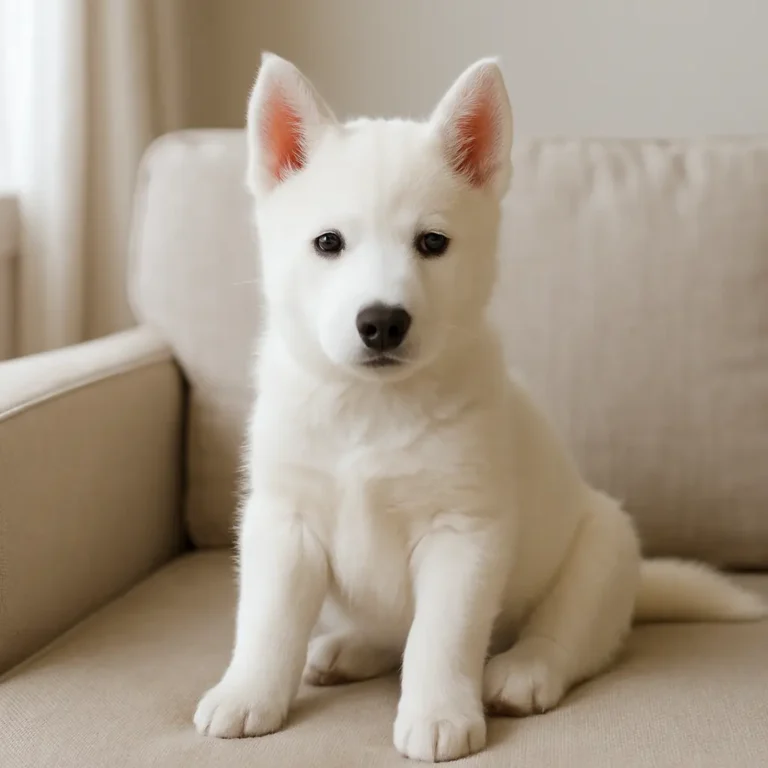
Raising a White Husky puppy is both exciting and challenging. These energetic dogs require early socialization and training to become well-behaved adults. From a young age, White Huskies show a lot of curiosity and intelligence, making them quick learners. However, due to their independent nature, they can also be a bit stubborn. It’s important to start with basic obedience training and socializing with other dogs and people. Ensure your White Husky puppy gets plenty of physical exercise to avoid destructive behavior. As they grow, they will develop into loyal companions who thrive on affection and attention.
Breed Traits
White Huskies are known for their striking appearance, with an all-white coat, erect ears, and piercing eyes. They're athletic, intelligent, energetic, and friendly, making them perfect companions for active families.
White Huskies typically live between 12 and 15 years. Their lifespan can vary based on genetics, diet, and overall care, with proper exercise and a healthy diet contributing to a longer, happier life.
White Huskies stand around 20 to 24 inches tall at the shoulder, with males typically being larger than females. Their size makes them well-suited for active lifestyles and outdoor adventures.
A White Husky usually weighs between 35 to 60 pounds. Males tend to be on the heavier side, while females typically weigh less. Proper nutrition and exercise are essential for maintaining a healthy weight.
White Huskies thrive in cooler climates due to their thick coat. They require plenty of space for exercise, ideally in a large yard or an environment that allows for regular outdoor activities and socializing.
Breed Characteristics
White Huskies are known for their striking white fur and eye-catching blue or multicolored eyes. They are highly energetic, intelligent, and loyal, making them excellent companions for active individuals and families.
White Huskies are affectionate and enjoy the company of their families. They tend to bond closely with their owners, especially when given attention, love, and plenty of physical activity.
Physically, White Huskies have a robust, athletic build with a double-layered, thick coat. Their erect ears, piercing blue eyes, and striking white fur make them highly recognizable and visually stunning.
White Huskies are generally friendly and social with other dogs, especially when raised with them. They enjoy the company of other active breeds and are typically not aggressive, making them great companions.
White Huskies are independent, playful, and intelligent. While they can be aloof at times, they are loyal to their families and enjoy bonding with their owners. They thrive on mental and physical stimulation.
How to Train Your White Husky
Training a White Husky requires patience and consistency. These dogs are intelligent but can also be stubborn, making it important to start training early. Positive reinforcement techniques work best, and they respond well to treats and praise. Socialization is key to ensuring they grow up well-behaved around other animals and people. Consistent obedience training will help curb any independent streaks. Additionally, because Huskies are high-energy dogs, regular exercise is a must. Mental stimulation like puzzle toys or agility training will keep them entertained. With dedication and the right training, your White Husky will grow into a well-mannered companion.
White Husky History & Facts
The White Husky is a color variation of the Siberian Husky, which originated in the cold northern regions of Siberia. These dogs were bred by the Chukchi people, who relied on them for sledding, herding, and companionship. Huskies, including the White variety, are known for their endurance, strength, and ability to withstand extremely cold temperatures. Over time, their popularity grew beyond Siberia, and they became known for their striking appearance and friendly nature. Today, White Huskies are prized for their beauty and energetic, playful temperament, making them a popular choice for dog lovers worldwide.
Husky Dog Popular Mix Breeds: Common Husky Mixes
Huskies are known for their stunning looks and energetic personalities, making them popular for crossbreeding. Common Husky mix breeds include the Black Lab Husky Mix, Golden Retriever Husky Mix, and Black German Shepherd Husky Mix. These mixed breeds inherit the Husky’s striking appearance and energetic traits, making them great family companions. For those looking for a unique look, there are also mixes like the Husky Corgi Mix or the Poodle Husky Mix. Each mix brings its own personality and characteristics, but all share the Husky’s love for exercise and adventure.
White Huskies have a high-energy nature and require a balanced, nutrient-rich diet to support their active lifestyle. A high-quality dog food with a good amount of protein, such as chicken or fish, will help maintain their muscle mass and stamina. Look for dog food that includes healthy fats, such as omega-3 fatty acids, to promote coat health and skin integrity. Huskies are prone to weight gain if overfed, so be mindful of portion control. Fresh water should always be available. Avoid overfeeding and stick to a feeding schedule to prevent obesity in this active breed.
Breed Behavior: Friendly, Independent, and Energetic
White Huskies are friendly, independent, and highly energetic. They are known for their playful nature, but their independent streak may make training a bit challenging. They love being around their families but may enjoy a little alone time. Early socialization helps them develop into well-rounded dogs.
Alertness
White Huskies are naturally alert and curious. With their strong prey drive, they are quick to notice movement or changes in their environment. Their keen senses make them excellent watchdogs, though not overly aggressive.
Protectiveness
These dogs are protective of their families and will alert you to any potential threats. However, they are not typically aggressive. Their natural instinct is to watch over loved ones, but they are friendly towards familiar faces.
Prey drive
White Huskies have a high prey drive due to their history as sled dogs. They may chase smaller animals, so keeping them on a leash during walks or in a securely fenced area is essential.
Aggressiveness
While White Huskies are loyal and protective, they are generally not aggressive. They can become territorial or show signs of aggression if not socialized properly, but with training, they are friendly and calm.
Barking level
They are moderate barkers, typically barking when they sense unfamiliar activity. They serve as good watchdogs without being excessively noisy. Proper training helps curb unnecessary barking indoors.
Trainability
Due to their intelligence and eagerness to learn, they are highly trainable. They excel in commands, tricks, and agility tasks. Positive reinforcement methods yield the best results.
Mental stimulation needs
This mix requires plenty of mental engagement, such as puzzle toys, interactive games, and training exercises. Without it, they may become bored and exhibit undesirable behaviors like chewing.
Intelligence
With high problem-solving skills, this mix ranks among the most intelligent dog hybrids. They quickly grasp new commands and enjoy participating in mentally stimulating activities like fetch or agility courses.
Barking Level: Moderate to High
Husky mixes are energetic, eye-catching hybrids that bring together the Siberian Husky’s striking looks with the unique traits of other breeds. Take the Boxer X Husky (Boxsky), a muscular, high-energy dog that thrives in active homes. The Boxsky blends the Boxer’s loyalty and playfulness with the Husky’s endurance, making it a great fit for families who love the outdoors.
If you’re after something more compact yet equally lively, the Husky X Terrier (Huskier) delivers bold attitude in a smaller package. These dogs are alert, clever, and full of spunk, perfect for experienced owners.
For a fluffier companion, the Husky X Chow Chow (Chowsky) combines dense coats and independent natures. The Chowsky is protective, loyal, and known for its powerful appearance.
Explore the Boxer Husky Mix, Husky Terrier Mix, and Chow Husky Mix to discover which hybrid best suits your home.
Training a White Husky can be challenging because of their independent streak. They are intelligent and learn quickly but can be stubborn. Consistent positive reinforcement and patience are key to successful training.
The White Husky is a generally healthy breed, but like all dogs, they can be prone to certain health issues. Some common health concerns include:
Hip Dysplasia: A condition where the hip joint doesn’t fit into the hip socket properly, leading to arthritis and discomfort.
Eye Issues: Huskies are known for their beautiful blue eyes, but they can also suffer from cataracts and progressive retinal atrophy (PRA), both of which can cause vision problems.
Hypothyroidism: A thyroid disorder that affects metabolism, causing lethargy and weight gain.
Epilepsy: Some Huskies may experience seizures, though this is rare. Ensuring that your White Husky gets regular vet check-ups, stays active, and maintains a balanced diet can help reduce the risk of these conditions.
Dog Breed Size: Medium Yet Mighty
The White Husky is a white medium-sized breed that generally weighs between 35-60 pounds and stands about 20-24 inches at the shoulder. Despite their medium size, they have a strong, muscular build and are known for their stamina and endurance. They are physically capable of participating in various outdoor activities, including running, hiking, and other forms of high-energy exercise. Their size makes them suitable for active families, but they require ample space to move around and play. It’s important to ensure that this white dog breed get enough exercise and mental stimulation to stay happy and healthy.
White Huskies faq
Are White Huskies good with children?
Yes, White Huskies are typically friendly, affectionate, and playful, making them excellent companions for children. However, early socialization and supervision are important for ensuring positive interactions.
How much exercise do White Huskies need?
White Huskies require 1-2 hours of exercise daily. They enjoy running, hiking, and long walks. Without sufficient exercise, they may become bored and engage in undesirable behaviors.
Do White Huskies shed a lot?
Yes, White Huskies shed heavily, especially during shedding seasons (spring and fall). Regular grooming helps manage the shedding and keeps their coat looking neat.
Are White Huskies easy to train?
White Huskies are intelligent but independent, making them somewhat challenging to train. Early socialization and consistent, positive reinforcement will help with obedience training.
Can a White Husky live in an apartment?
While White Huskies can adapt to apartment living, they require ample exercise and space to run. Ideally, they should have access to outdoor areas or regular outdoor activities.
How long do White Huskies live?
White Huskies typically live between 12-15 years with proper care, regular exercise, and a healthy diet. Regular vet check-ups help ensure a long, healthy life.
Are White Huskies prone to health problems?
Like all breeds, White Huskies can be prone to certain conditions, including hip dysplasia, eye problems, and hypothyroidism. Regular vet visits and a healthy lifestyle can help manage these risks.
Do White Huskies get along with other pets?
White Huskies are generally social dogs and can get along well with other pets, especially if properly socialized. However, they may have a high prey drive, which can make them less suitable for homes with small animals like cats.
Living with a White Husky means sharing your life with a loyal, energetic, and affectionate dog. These dogs require a lot of exercise and mental stimulation to stay happy and healthy. Their independent nature can make training a bit challenging, but with patience and consistency, they become well-behaved companions. They are excellent family pets, enjoy socializing with other dogs, and love being involved in outdoor activities. With the right care and attention, a White Husky will be a devoted and fun-loving addition to your home for many years.

